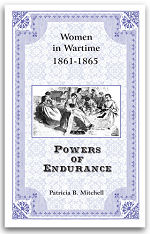
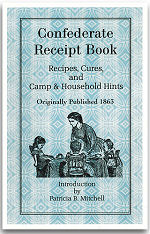



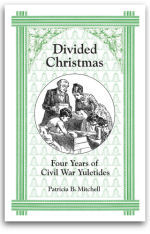
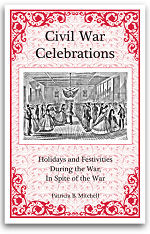


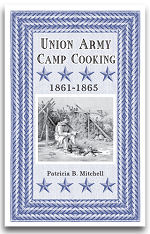

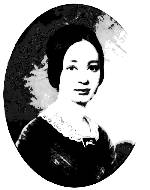
Portrait of young Varina Howell Davis.
Mill View near Augusta, Ga.
Oct. 10, 1865.Colonel John J. Craven.
Chief Medical Officer.
Fortress Monroe, Va.My Dear Colonel;
Though you remain irrevocably dumb, I am sure you hear me, and in addressing you I feel as if writing to one of my oldest and most reliable friends. Every letter from my husband comes frighted with good wishes for you and thanks for all your kindness to him in his hours of anguish and solitude. Can you doubt that my prayers for you, and apprecation of your goodness have been even greater than his, for I could do nothing but pray. Mr. Davis sent me carte de visite of your dear Anna whose sweet face my baby knows and has been taught to kiss as his father's friend. The baby sends her a fan and a few white flowers made in Augusta. Mr. Davis writes me that she has gone to the Moravian School near Easton, where I trust our niece may have the pleasure of seeing her. I am rendered very anxious by the obstinacy of the erysipelas with my suffering husband. He complains — in answer to entreaties for an account of his condition without concealment of a loss of sleep. I dread paralysis for him, his nerves have been so highly strung for years without relief. If you can, dear Doctor Craven, do entreat, and perhaps you may prevail upon the authorities to let him sleep without a light. He is too feeble to escape, and could not bear a light in his room when in strong health. The sequel of these attacks has always been an attack of amanaosis, and in one of them he lost his eye. It first came on with attack of acute-neuralgia, but it is useless for me to begin to tell you of his condition, you must have seen pretty well its peculiarities in the long and kind watches you have kept with him. I had hoped to relieve his mind by a full letter of personal narratives, but that letter he has not received.
When he was taken from me on the ship the provost guard and some women detectives came on board, and after the women searched our persons the men searched our baggage. Either they or the soldiers standing around took every thing they fancied, and some things so large that I did not see how their conduct could escape the eye of the guard, and of the officer who superintended the search. They then told my servants that they could go ashore if they did not desire to go to Savannah. The husband of my negro nurse forced her to go, and the white girl left from an unwillingness to be exposed to a southern climate. I entreated to be permitted to embark at Charleston, as my sister Miss Howell still continued to be ill, and I feared to return on the ship with a drunken purser, who had previously required Colonel Pritchard's authority to keep him in order, and going back, Mrs. Clay, my sister and myself would be the only women on the ship, but this was refused. Acting as my only chambermaid and nurse, and the nurse also of my sister and Mrs. Clay, who were both ill, we started for Savannah. We had a fearful gale in which the upper deck once or twice dipped water, and no one could walk, but as I felt as wretched as could be the fury of the elements, but the soldiers now began to open and rob our trunks again. The crew, however, gave us some protection and one of the officers in the engine room gave up his cabin and locked every thing we had left up in it.
The Lieutenant of the 14th Maine, Mr. Grant, though a plain man, had the heart of a gentleman, and took care of us with the greatest assidity. Some of the soldiers and crew helped me to nurse and saved me many an hour of wakefulness and fatigue. My little daughter Maggie was quite like an old woman, she took her sister early every morning, for the nights were so rough I could not sleep because it was necessary tho hold the infant to avoid brusing it, and with the assistance of our faithful servant, Robert, who held her still while she held her sister, she nursed her long enough for me to rest. Little Jeff and I did the housekeeping it was a fair division of labor, and not as it displayed the good hearts of my children. At the harbors of Charleston the sick began to improve. We procured ice and milk, and the days rest with the ship at anchor gave them, improved them much. Arrived at Savannah we trudged up to the hotel quite in emigrant fashion, Robert, with the baggage and Margaret with the baby, I with Billy and Jeff and Maggie in quite an old fashioned manner keeping all straight and acting as parcel carrier, for we could not procure any carriage, and must walk until we reached the Pulaski House, when after a day and night we procured comfortable rooms. The innkeeper was a kind man, and felt for my unfortunate condition. He therefore did every thing in his power to make us comfortable.
A furry incident happened the day I arrived there. A black waiter upon answering my bell, and being told to call my man servant Robert, replied very impertinently that “if he should see Robert he would give the order, but did not expect to see him.” When Robert heard it he waited till all the black servants had assembled at dinner and then remarked that he should hate to believe that there was a colored man so low as to insult a distressed woman, but if so, though a peaceable man, he should whip the first who did so. The guilty man began to excuse himself, where upon Robert said “Oh it was you, was it? Well you do look mean enough for that or any thing else,” from that time all the greatest assidirity could was done for me, first from espirit de corps, and then from kind feelings.
The people of Savannah treated me with the greatest tenderness. Had I been a sister long absent and just returned to their home, I could have received no more tender welcome. Houses were thrown open to me, anything and everything was mine. My children had not much more than a change of clothing after all the parties who had us in charge had done lightening our baggage, so they gave the baby dresses and the other little ones enough to change until I could buy or make more, unfortunately for me, General ______, who I hear was “not to the manor born” was in command of the district at the time. I ask permission to see him, and as I was so unwell that I could not speak above my breath with a cold, and suffered with fever constantly, the result of exposure on the ship, I wrote to beg that he would come to see me, for his aide had told me the night before that I could not be permitted to leave Savannah, and having been robbed of nearly all my means, I could not afford to stay at the hotel, and beside, as soon as I reached the hotel detectives were placed to watch both me and my visitors, so I did not feel at liberty, thus unaccompanied to go to private houses.
General ______'s aide, whose animus was probably irreproachable, but whose arthrography was very bad directed to tell me that except under very extraordinary circumstances, he did not go out of his office, and “all such” (which I afterwards found to mean myself) as desired to see him would call at his office, to which I answered that I thought my illness and my circumstances constituted me an extraordinary case, but that I was sorry to have asked anything which he “felt called upon so curtly to refuse” and requested to be informed what hour would please him on the following day, and I would do myself the honor to call upon him. Where upon the same information, well meaning, ill spelling young gentleman wrote to me that “all such as desired might draw nigh from nine until three.” I went accompanied by General Mercer of Savannah, need I say that General ______ did himself justice, and verified my preconceived opinion of him in our interview, in which he told me he “guessed I could not telegraph to Washington, write to the heads of departments there or to any body, except through the regular channel approved and “I could not write to my friends” except through the provost Marshall's office,” and that I was permitted to pay my expenses, but must remain within the limits of Savannah. With many thanks for the large liberty accorded so graciously, I bowed myself out, first having declined to get soldiers, rations by application for them to this government. In this condition I remained for many weeks, until, fortunately for me, General Birge relieved him, who had it not in his power, however, to remove the restrictions any further than to take the detectives away, of whom I heard, but did not see. But General Birge permitted me to write unrestrictedly to whom I pleased, and appeared anxious, in the true spirit of a gentleman to offer all the courtesies he consistently could.
My baby caught the whooping-cough and was ill almost unto death for some days with the fever which precedes the cough, and then she slowly declined. I did what I could to give her fresh air, but the heat was so intense, the insects so annoying and two rooms such close quarters, that she and I suffered much more than I hope you and yours will ever know by experience. My most acute agony arose from the publication and re-publication in the Savannah Republican of the shocking scene in Mr. Davis casemate, which to think of stops my heart's vibration. It was piteous to hear the little children pray at their grace “that the Lord would give father something which he could eat, and keep him strong, and bring him back to us with good senses to his little children, for Christ's sake” and nearly every day during the hardest, bitterest of his imprisonment our little child Maggie had to quit the table to dry her tears after this grace, which was of her own composition. I believe Doctor I should have lost my senses if these severities had been preserved in, for I could neither eat nor sleep for a week, but opiates, and the information of the change effected by your advice, relieved me, and I have thanked God nightly for your brave humanity. It is easier to fight with a revolver than to repeat unpleasant truths to a hostile and untrammelled power in the full indulgence of its cruel instincts. All honor to the brave men who fearlessly did so.
Though I ate, slept, and lived in my room, rarely or never going out in the day, and only walking out late at night with Robert, for protection, I could not keep my little ones so closely confined. Little Jeff and Billy went out on the street to play and there Jeff was constantly told that he was rich, that his father had “stolen eight millions” etc. Billy was taught to sing “we'll hang Jeff Davis on a sour Apple Tree” by giving him a reward when he did so, and he made such good friends with the soldiers that the poor child seemed to forget a great deal of his regards for his father. The little thing finally told me one day, “You thinks I'se somebody, so is you, so is father, but you is not, so is not any of us but me. I am a yankee every time.” The rough soldiers doubtless, meant to be kind but such things would [cut] me to the quick. They took him off and made him snatch apples off the stalls if Robert lost sight of him for a moment. Finally, two women from Maine contemplated whipping him because they found out he was his father's son, but, “a man more wise did them surprise,” and took him off just in time to avoid a very painful scene to them as well as to me.
These things went on in the streets, I refer only to the street teachings, though these women were, with one other dishonerable exceptions to the ladies in the house, until Captain ______ was ordered to Savannah on duty. He brought with him a person who I heard was his wife, as I never went into the parlor I did not see her, but my little son Jeff went accidentally into the room one day, and interrupted a conversation she was indulging herself in with one of the negro waiters, in which he was laying down “the proper policy to be pursued towards Mr. Davis. The servant, having been brought up by a lady felt very uncomfortable and said, “Madam, there is his son.” She called Little Jeff up to her and told him his father was a “Rogue, a liar, an assassin, and that means a murderer, boy, and I hope he may be tied to a stake, and burned a little bit at a time with light wood knots. God forbid that you should grew up a comfort to your mother. Remember you can never be a gentleman while this country lasts. Your father will soon be hanged, but that death is too quick.” The negro retired, mortified, and sent my nurse to call little Jeff, and so with his little face purple with mortification, and wet with tears from his streaming eyes, he came up to me leaving the pious and patriotic lady to find another audience as congenial to her taste as the first had been. I commended Jeff's gentlemanly conduct in making no reply, cautioned him against ever persecuting or distressing a woman or a friend, it took that shape made applications for permission to go away the next day to Augusta, was refused then prepared the children to go where they would not see such indignantly patriotic and prophetic females.
Nothing however, but the dread of intruding into a secret and sacred grief prevented my writing poor Captain ______ a sympathetic note, to condole with him upon the dispensation of providence under which, in the person of his wife, he groaned. Hourly scenes of violence were going on in the streets, and not reported, between the whites and blacks, and I felt that the children's lives were not safe. During General ______'s regime a negro sentinel leveled his gun at my little daughter to shoot her for calling him “Uncle,” I could mourn with hope if my children lived, but what was to become of me if I was deprived of them? So sent them off with many prayers and tears, but confident of the wisdom of the decision.
On the ship I understood a man was very abusive in their hearing of Mr. Davis; which my faithful servant Robert inquired with great interest, “either you tell me, I am your equal, you put me along the side of you in every thing.” The man said “certainly” then said Robert “take this from your equal,” and knocked him down. The Captain was appealed to, and upon a hearing of the case justified Robert and required an apology of the leveled.
Little Jeff is now at an endowed grammar school near Montreal, in charge of a Mrs. Morris, who has the care of ten little boys of good family some of them, southern boys, and is happy so he writes me. Mrs. Morris superintends his clothes and person and teaches him his lessons. She was chosen by the faculty of the college for her high character. Maggie is at the Convent of the Sacred Heart in the same place where General Williams Preston's little girls are, and very kind they are to her. A nun is always present with the small girls, who are seperated from the large girls. Little Billy is his grandmother's one pet and idol, always with her and in pretty good health. I have sent their dear father a picture of Maggie's school and a little scribbled letter from his big boy to me, as soon as the children were gone, I hoped with my little weak baby “you see I am very honest with you” to make my escape out of the country to them, but when, upon coming to Augusta, which General Stedman gave me leave to do immediately upon his accession of General Brannen who succeded General Bridge, I was informed by a gentleman who said he had been told so authoritatively that “if I ever quitted the country under any possible object I would, no matter what befell Mr. Davis, never be allowed to return.” I abandoned the intention, as might makes right in my case, and as my sister's health had failed rapidly in the south, and as she is a girl of rare judgement and good feeling, I sent her with my nephew to New York enroute for Canada to take care of my devoted mother, who is now too old and delicate to be left alone.
My two nephews found me here about a month ago, and desired to take me home with them, but finding that the length of my tether only permitted me to browse “in Georgia,” they stayed two days and was then forced to go home to their families. My baby has grown fat and rosy as the “Glory of France,” a rose which Mr. Davis recollects near the gate of our home. Under the kind treatment I have received, the fine country hair, (five miles from Augusta) and the privacy, I have also grown much better, can eat and sleep, and begin to feel alive again with the frosty air and loving wards and letters which meet me here as in Savannah. Mr. Georgia Schely is my host, and never had a child in his father's home a warmer welcome. The little baby eats hominy and drinks fresh milk, grows in grace and weight, talks a little (and being more gentle than little Jeff's friends Mrs. ______ is a great oit with all.) The difficulty is to accept all the invitations I get or to refuse them, rather the whole southern country teeming with homes, the doors of which open wide to receive me and people are so loving, talk to them and that I cannot realize I do not know them intimately. Mr. Davis should dismiss all fear for me.
Please give your good wife as much gratitude as she will receive from me, and I cannot permit you to measure it for yourself. My children shall rise up and call her blessed. May God show her and hers that mercy which you have been the means of bringing to my poor husband, and you will be blessed indeed. This is the constant prayer of your grateful friend.
Varina Davis.
Copyright © 2005–2009 Patricia B. Mitchell.